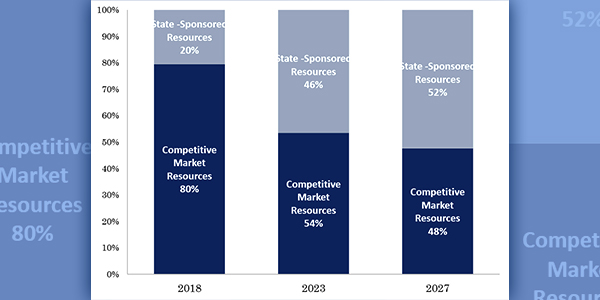By Robert Mullin
New England utility regulators have gained a key ally in their call for an initiative to explore how the region’s wholesale energy market could be reshaped to accommodate the growth of state-sponsored resources.
The New England States Committee on Electricity (NESCOE) last month asked ISO-NE to “dedicate market development and planning resources” next year to support states and stakeholders “in analyzing and discussing potential future market frameworks” compatible with the state energy and environmental laws that could alter the region’s resource mix.
The New England Power Generators Association (NEPGA) wholeheartedly agrees. In a letter to ISO-NE Tuesday, NEPGA President Dan Dolan said his group “strongly supports” NESCOE’s request to kick off the discussion and emphasized “the need to ensure that the future wholesale electricity market design preserves electric reliability, resource adequacy and other needed services in a robust competitive, market-based manner.”
NESCOE’s July memo noted New England adopted a wholesale market in the 1990s to ensure “market dynamics rather than regulatory orders” set electricity prices and to shift the risks of generation investment decisions from ratepayers to investors.
But the energy landscape has shifted drastically since then, with New England states boosting their renewable portfolio standards and mandating large solicitations of offshore wind. As a result, state-sponsored resources are expected to comprise more than half the generation participating in the ISO-NE market by 2027.
NESCOE said the increasing reliance on resource procurements outside the ISO-NE market “make a conversation about the objectives of the wholesale markets, and what we are collectively asking it to do, sensible.”
NEPGA’s Aug. 13 letter says NESCOE’s request is similar to one NEPGA made last December, when it warned the RTO’s board of directors the region is “fast approaching a tipping point” as an increasing volume of state policy resources participating in the wholesale market leave competitive generators unable to recover their costs, putting them at risk of early retirement and forcing ISO-NE to rely on out-of-market mechanisms to keep vital resources online. (See FERC Approves Mystic Cost-of-Service Agreement.)
NEPGA said it was “unconvinced” by the board’s response to its letter: that ISO-NE would address the group’s concerns through its ongoing “energy security improvements” effort. (See ISO-NE Filing, Whitepaper Address Energy Security.)
“With the benefit of several months review of the ISO proposals and in light of the intention that such revenues would be considered a reduction to de-list bid offers, NEPGA remains unconvinced that [the energy security efforts] address the fundamental concerns of a lack of future competitive revenue opportunities for resources that provide reliability services,” Dolan said in the letter.
NEPGA suggested any discussions on market changes take place within the New England Power Pool (NEPOOL) committee process, which “would provide an important measure of structure and diligence to these efforts which, given their likely complexity, will require deliberate and long-term discussions and consideration in order to be fruitful.”
Dolan said the NEPOOL process would also foster “meaningful engagement on the paramount question of how to preserve and reinforce competitively produced reliability services in the region.”
The generator group said it agrees with NESCOE that initial meetings should be devoted to “certain threshold questions,” including “an agreement as to the scope of future efforts related to potential improvement to existing markets or even consideration of new competitive market designs.” NEPGA said it believes any problem statement should focus on maintaining ISO-NE’s “core function” of using competitive markets to ensure reliability and resource adequacy
“Articulation of this ‘problem statement’ is critical to the commitment to priority use of ISO-NE and stakeholder resources for these purposes,” Dolan said. “NEPGA offers that this should be completed prior to embarking on the deliberative process to analyze and discuss potential market design enhancements.”
NEPGA asked that ISO-NE work with NEPOOL and NESCOE to schedule a NEPOOL committee meeting in early 2020, adding that NEPOOL sectors and states should come to the meeting equipped with their own problem statements.
“This is a critical moment for the ISO, states & all invested stakeholders in New England to chart the path forward in a dramatically changing market. Just as NEPGA said nearly a year ago, if we’re going to have agency in our future, we must act — quickly!” NEPGA tweeted Wednesday.





